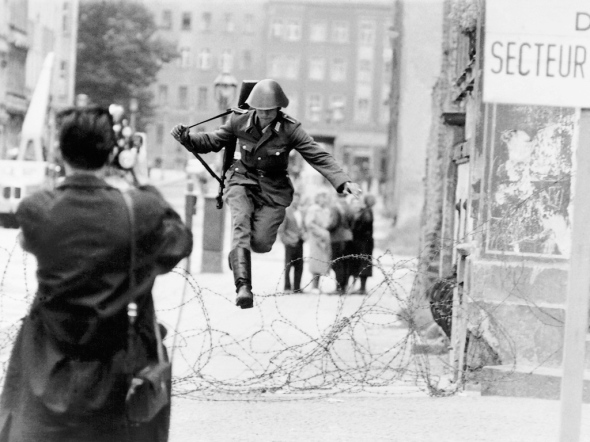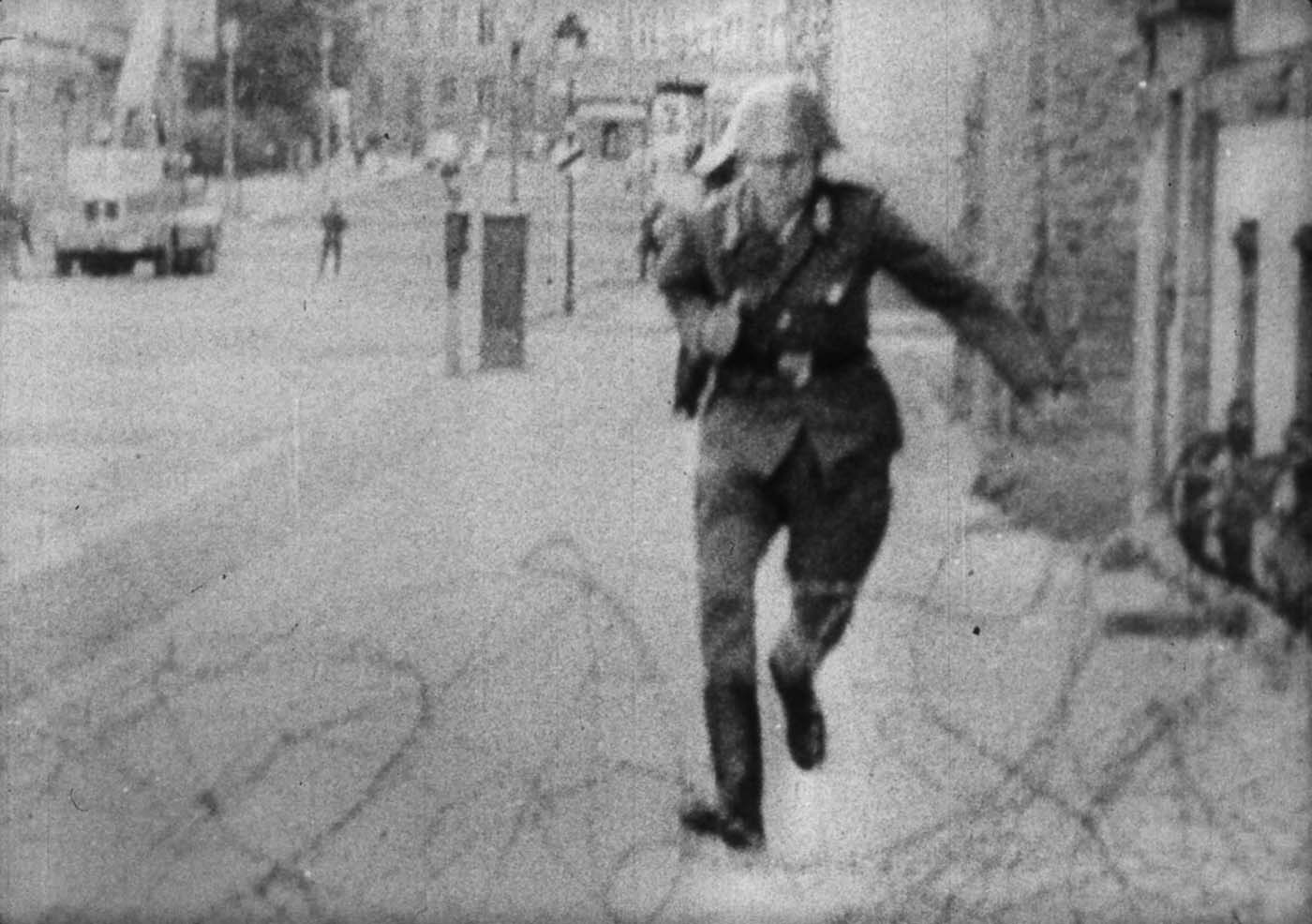Welcome to DU!
The truly grassroots left-of-center political community where regular people, not algorithms, drive the discussions and set the standards.
Join the community:
Create a free account
Support DU (and get rid of ads!):
Become a Star Member
Latest Breaking News
Editorials & Other Articles
General Discussion
The DU Lounge
All Forums
Issue Forums
Culture Forums
Alliance Forums
Region Forums
Support Forums
Help & Search
World History
Related: About this forumAugust 15, 1961: E. German border guard Conrad Schumann leaps into the French Sector of West Berlin.
Mon Aug 15, 2022: August 15, 1961: E. German border guard Conrad Schumann leaps into the French Sector of West Berlin.
Sun Aug 15, 2021: August 15, 1961: E. German border guard Conrad Schumann leaps into the French Sector of West Berlin.
Thu Aug 15, 2019: August 15, 1961: E. German border guard Conrad Schumann leaps into the French Sector of West Berlin.
Although I love this picture, I suspect that in reality, all his family members were made to suffer as a result. There was probably not a happy ending for them.

More about the incident:
The story of Berlin Wall in pictures, 1961-1989
{snip}

East German border guard Conrad Schumann leaps into the French Sector of West Berlin over barbed wire on August 15, 1961. More info about this picture.
{snip}
{snip}

East German border guard Conrad Schumann leaps into the French Sector of West Berlin over barbed wire on August 15, 1961. More info about this picture.
{snip}
Conrad Schumann defects to West Berlin, 1961

“The Leap into Freedom”. 1961. (The picture is linked from Imgur).
Conrad Schumann was immortalized in this photograph as he leapt across the barricade that would become the Berlin Wall. The photo was called “The Leap into Freedom”. It became an iconic image of the Cold War.
Born in Zschochau, Saxony during the middle of World War II, he enlisted in the East German state police following his 18th birthday. Since he had always shown himself to be a loyal and hardworking young citizen of the German Democratic Republic, local military officials offered him an elite position in the paramilitary Bereitschaftspolizei or BePo (“riot police”), which was specifically conceived to suppress rebellion.
On 15 August 1961, the 19-year-old Schumann was sent to the corner of Ruppiner Strasse and Bernauer Strasse to guard the Berlin Wall on its third day of construction. At that time, the wall was only a low barbed wire fence. At the same spot, on the West Berlin, was standing the 19-year-old photographer Peter Leibing. For more than an hour, Leibing stood watching the nervous young non-commissioned officer as he paced back and forth, his PPSh-41 slung over his shoulder, smoking one cigarette after another. “Come on over, come on over!” (Komm’ rüber!) the West Berlin crowd on Bernauer Strasse chanted. “He’s going to jump!” one passerby remarked.
And at four p.m. on August 15, 1961, Leibing got lucky. Schumann tossed aside his cigarette, then turned and ran for the coil of barbed wire that marked the boundary between East and West. He jumped, flinging away his gun as he flew, and Leibing clicked the shutter. A nearby newsreel cameraman captured the same scene on film (the clip below).
{snip}

“Come on over, come on over!” (Komm’ rüber!) the West Berlin crowd on Bernauer Strasse chanted. (Still picture from the video footage).
{snip}
But fame and escape brought him no happiness. The police psychologist who interviewed Schumann in Berlin shortly after his escape noted in his report that the soldier was deeply distressed at the publicity his act was going to bring both him and his family at home. Not only did he have severe qualms about having deserted his comrades in the midst of a “combat operation” and having violated his sacred oath, he also feared for his life. There were a number of proven cases of East German refugees and even West German critics who were either murdered or kidnapped by Stasi agents.
{snip}
In an interview in the 1990s, Schumann told reporters that he only really felt free after the fall of the Berlin Wall in 1989. Even so, he avoided visiting his parents and siblings in Saxony for several years following reunification, and his former comrades wanted nothing to do with him. Once a deserter, always a deserter. On 20 June 1998, aged 56, suffering from depression, he committed suicide, hanging himself in his orchard near the town of Kipfenberg in Upper Bavaria.
(Photo credit: Chronos Media GmbH – Getty Images / Peter Leibing).

“The Leap into Freedom”. 1961. (The picture is linked from Imgur).
Conrad Schumann was immortalized in this photograph as he leapt across the barricade that would become the Berlin Wall. The photo was called “The Leap into Freedom”. It became an iconic image of the Cold War.
Born in Zschochau, Saxony during the middle of World War II, he enlisted in the East German state police following his 18th birthday. Since he had always shown himself to be a loyal and hardworking young citizen of the German Democratic Republic, local military officials offered him an elite position in the paramilitary Bereitschaftspolizei or BePo (“riot police”), which was specifically conceived to suppress rebellion.
On 15 August 1961, the 19-year-old Schumann was sent to the corner of Ruppiner Strasse and Bernauer Strasse to guard the Berlin Wall on its third day of construction. At that time, the wall was only a low barbed wire fence. At the same spot, on the West Berlin, was standing the 19-year-old photographer Peter Leibing. For more than an hour, Leibing stood watching the nervous young non-commissioned officer as he paced back and forth, his PPSh-41 slung over his shoulder, smoking one cigarette after another. “Come on over, come on over!” (Komm’ rüber!) the West Berlin crowd on Bernauer Strasse chanted. “He’s going to jump!” one passerby remarked.
And at four p.m. on August 15, 1961, Leibing got lucky. Schumann tossed aside his cigarette, then turned and ran for the coil of barbed wire that marked the boundary between East and West. He jumped, flinging away his gun as he flew, and Leibing clicked the shutter. A nearby newsreel cameraman captured the same scene on film (the clip below).
{snip}

“Come on over, come on over!” (Komm’ rüber!) the West Berlin crowd on Bernauer Strasse chanted. (Still picture from the video footage).
{snip}
But fame and escape brought him no happiness. The police psychologist who interviewed Schumann in Berlin shortly after his escape noted in his report that the soldier was deeply distressed at the publicity his act was going to bring both him and his family at home. Not only did he have severe qualms about having deserted his comrades in the midst of a “combat operation” and having violated his sacred oath, he also feared for his life. There were a number of proven cases of East German refugees and even West German critics who were either murdered or kidnapped by Stasi agents.
{snip}
In an interview in the 1990s, Schumann told reporters that he only really felt free after the fall of the Berlin Wall in 1989. Even so, he avoided visiting his parents and siblings in Saxony for several years following reunification, and his former comrades wanted nothing to do with him. Once a deserter, always a deserter. On 20 June 1998, aged 56, suffering from depression, he committed suicide, hanging himself in his orchard near the town of Kipfenberg in Upper Bavaria.
(Photo credit: Chronos Media GmbH – Getty Images / Peter Leibing).
InfoView thread info, including edit history
TrashPut this thread in your Trash Can (My DU » Trash Can)
BookmarkAdd this thread to your Bookmarks (My DU » Bookmarks)
0 replies, 1250 views
ShareGet links to this post and/or share on social media
AlertAlert this post for a rule violation
PowersThere are no powers you can use on this post
EditCannot edit other people's posts
ReplyReply to this post
EditCannot edit other people's posts
Rec (4)
ReplyReply to this post